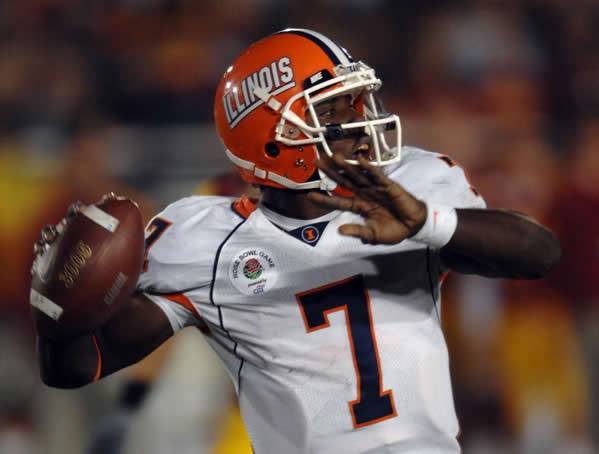 The first half ended the same way it began, with Juice Williams throwing the ball.
The first half ended the same way it began, with Juice Williams throwing the ball.
But where the first play was a nice, short, confidence-building toss to Chris Duvalt, the last was a mess. And a microcosm of the quarterback’s three years at Illinois.
Up by 14 points with the clock ticking down below ten seconds, Team Blue was deep in its own territory. There was no need for any more first-half football, and conventional wisdom told Williams to take a knee. So that’s what he did. The crowd turned, almost in unison, toward the south end zone and the gathering reunion of Mike White era players. After two tepid quarters, the fans still had a lot of pent up applause and it had to be directed somewhere.
But then something weird happened. With four seconds left, Blue called a timeout. The coach, apparently, did not want to waste a trailing wind that was gusting into the 40s. A few seconds later, Williams dutifully took the snap and rolled to his right. Under pressure almost immediately, he threw a gorgeous long ball that sailed sixty yards in a tight spiral, for a few seconds capturing the attention and imagination of the fans — right up until it landed ten rows high in the mostly vacant east stands. The closest person to the ball was a young boy who arrived on scene just in time to almost catch it.
The orange-clad crowd, which had no reason to expect much at the beginning of the play, was still disappointed.
A lot can be forgiven in the Spring Game. Missed blocking assignments, poor kicking, botched snaps — all mistakes rectified with repetition. But the problems on Saturday were of the veteran variety. They were coaching mistakes. They were softly run routes. They were short passes falling incomplete.
Of these last, the excuse was that it was windy in Memorial Stadium, a refrain as common Saturday as “bringing up fourth down.” But this excuse is a lot like a law student complaining that he’s not good at tests. Law school is tests. Central Illinois is windy. And the passing game is supposed to be an Illini strength.
On the other hand, there were some bright spots.
If a highly-touted recruit can be said to be a pleasant surprise, Jacob Charest fit the bill. The redshirt freshman looked every bit a college player. While his first play from scrimmage ended before it started, with a delay of game penalty, his first pass was a completion to Jeff Cumberland (who promptly fumbled the ball).
Charest wasn’t spectacular, but he also wasn’t skittish. His passes were tight and accurate, and many of the ones that fell incomplete could as easily be blamed on the receiver as the quarterback. Even when he was put on the seat of his pants by the rush, he got up talking.
Mikel LeShoure also looked good. One of a quartet of running backs, the local product seemed slim and quick. He even managed to rouse the sleepy, distracted crowd with some very nice moves.
But overall, the effort seemed lackluster. And Coach Zook knew it.
So after the game he mentioned that “obviously, we’re not there yet.” This was the first in a series of vague, expectation-managing pronouncements of the sort football coaches traffic in. Then Coach Zook noted that Juice Williams “has got a chance to be a pretty good football player for us.”
By this point, it might just be a rote remark for Zook. But it is a genuinely strange thing to say of quarterback with three seasons — and one Rose Bowl — under his belt. That the issue is still in doubt at this late date says a great deal about the past few years.
For the coming year it says this: Illini fans with even low hopes might still be disappointed.








